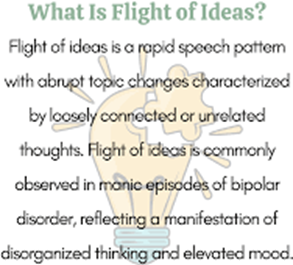During the mental status examination, the nurse observes that the client rapidly changes from one idea to another related thought. Which disordered thinking process is the client displaying?
Ideas of reference
Flight of ideas
Confabulation
Perseveration
The Correct Answer is B
Choice A rationale: this is a type of delusion involving the misinterpretation of random events as having personal significance or reference.
Choice B rationale: flight of ideas refers to a disordered thinking process involving rapid shifts from one topic to another. The client’s speech is often incoherent and difficult to follow.
Choice C rationale: this is a type of memory distortion involving the fabrication of stories or details to fill the gaps in an individual’s memory. Usually occurs in conditions such as dementia, substance abuse, and brain damage.
Choice D rationale: this refers to the repetition of the same word, phrase, or action over and over without being able to stop or switch to something else. Occurs in conditions such as schizophrenia, brain injury, or a stroke.

Nursing Test Bank
Naxlex Comprehensive Predictor Exams
Related Questions
Correct Answer is D
Explanation
Choice A rationale: Measured data involves quantitative information obtained through measurement and observation, not the client's self-report.
Choice B rationale: Objective data is observable and measurable, often obtained through physical examination or direct observation.
Choice C rationale: Shared data is not a commonly used term in the context of describing information provided by a client. However, it could refer to information that is communicated or exchanged between the nurse and healthcare professionals.
Choice D rationale: Subjective data refers to information provided by the client based on their own feelings, perceptions, or experiences. In this case, the client's statement about auditory hallucinations and difficulty concentrating represents subjective data.
Correct Answer is A
Explanation
Choice A rationale: This is an important step but it comes second after actively listening to the patient. Understanding the underlying emotions allows the nurse to respond appropriately and address the patient's concerns effectively. By identifying the emotions, the nurse can establish a foundation for constructive communication and work towards resolving the source of anger.
Choice B rationale: Listening actively is an important component of effective communication and it entails paying attention to the client's verbal and non-verbal cues. This shows empathy and an interest in the patient’s concerns.
Choice C rationale: Exploring options is relevant, but it is a subsequent step in the communication process after active listening and identifying emotions.
Choice D rationale: this is inappropriate especially when dealing with an angry patient as it may sound patronizing, insincere, and dismissive.
Whether you are a student looking to ace your exams or a practicing nurse seeking to enhance your expertise , our nursing education contents will empower you with the confidence and competence to make a difference in the lives of patients and become a respected leader in the healthcare field.
Visit Naxlex, invest in your future and unlock endless possibilities with our unparalleled nursing education contents today
Report Wrong Answer on the Current Question
Do you disagree with the answer? If yes, what is your expected answer? Explain.
Kindly be descriptive with the issue you are facing.
